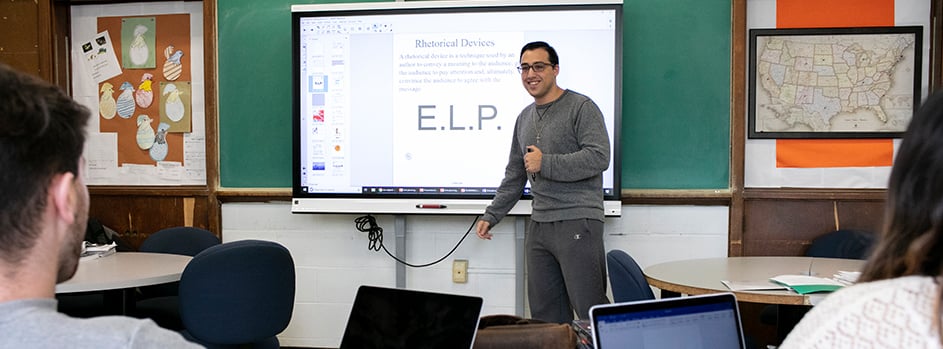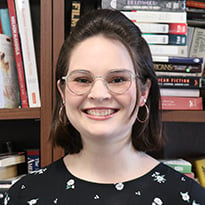BROOKLYN
245 Clinton Ave., Brooklyn, NY 11205
Main: 718.940.5300
Admissions: 718.940.5800
Fax: 718.940.5680
LONG ISLAND
155 W. Roe Blvd., Patchogue, NY 11772
Main: 631.687.5100
Admissions: 631.687.4500
Fax: 631.687.4539

Those who can, teach. Those who teach, lead. Get ready.
If you dream of becoming a middle or high school teacher, our Long Island’s Department of Adolescence Education is ready to help you develop the expertise and take on the training you need to succeed.
Secondary education offers the unique opportunity for teachers to share their passion for and knowledge of a specific subject. Our program provides students with up-to-date educational practices, along with extensive background in their major field. Candidates who are certified in New York State should be aware that certification is not automatically transferable to other states.
With skilled faculty and a high job placement rating, it’s no wonder St. Joseph’s secondary education program consistently ranks among the best teaching programs in the New York metropolitan area. Get ready for your future as a successful teacher with St. Joseph's University's Long Island’s Department of Adolescence Education.
 Courtney Cowie-Sladky ’19
Courtney Cowie-Sladky ’19"St. Joseph's University provided me with every resource available to help me succeed. The English teachers and adolescence education teachers are absolutely wonderful. Without them, I would certainly not be where I am today. They taught me essentially everything I needed to know, helped me find the areas I am interested in and encouraged me to pursue all my goals. I owe them so much!"



Gain a comprehensive foundation in the biological sciences, from organismal biology to microbiology and global systems. Learn in advanced labs with real-world applications, and find tangible results in the world of education.
Work in laboratory facilities on campus, with equipment used in industrial and medical labs. Apply your new-found laboratory skills to original research in organic chemistry, biochemistry and physical chemistry, all while getting ready to share the material with high school students.
Immerse yourself in the world of novels, poetry, films and art, gaining greater perspective and improving your writing skills along the way. English majors with a concentration in secondary education prepare to create their own literature and composition lesson plans for middle and high school students.
As a history major, students learn about a range of national and global histories — including the Renaissance, World War I and II, colonialism, the Holocaust and the atomic bombs dropped on Japan. With a concentration in adolescence education, get ready to extend your passion for the mysteries of the past with your future students.
In order to prepare to teach in the modern classroom, students study important topics and processes in current mathematics education. Develop skills in self-analysis and assessment, preparing to teach a diverse population of students who possess varying cognitive skills and learning styles.
If you have ever wanted to shape the mind of future leaders while helping them become globally conscious citizens, then a Spanish secondary education major just may be the right fit for you. Prepare to inspire students at the middle and high school levels, while sharing your passion for the Spanish language, art, literature, history and culture.
Students proficient in a second language can apply for the bilingual certificate extension. Through these courses, future teachers gain knowledge and develop competencies for working in a bilingual classroom or with students with speech and language disabilities.
Curriculum — Five Courses/15 Credits:
• CS/EDU 340 — Foundations, Theory and Practice of Bilingual General and Special Education
• CS/EDU 341 — Curriculum, Assessment and Methods of Teaching English as a Second Language in General and Special Education
• CS/EDU 342 — Curriculum, Assessment and Methods of Teaching Native Language Arts in General and Special Education
• CS/EDU 343 — Methods of Teaching Core Subject Areas in the Native Language and English in General and Special Education
• CS/EDU 344 — Assessment Strategies in Bilingual Special Education
Pre-requisite: In addition to English, proficiency in a second language.
The St. Joseph's University adolescence education program is consistently ranked among the best teaching programs in the New York Metropolitan area. The program, which prepares students to teach at the secondary level, has a high job placement rating and combines a solid teaching background with the professional standards mandated by New York and other states. Students participate in meaningful learning experiences and are introduced to developmental and learning-style theories, constructivism, multiple intelligence theories and the best pedagogical practices that support instruction for all students.
Get Social
Get Social